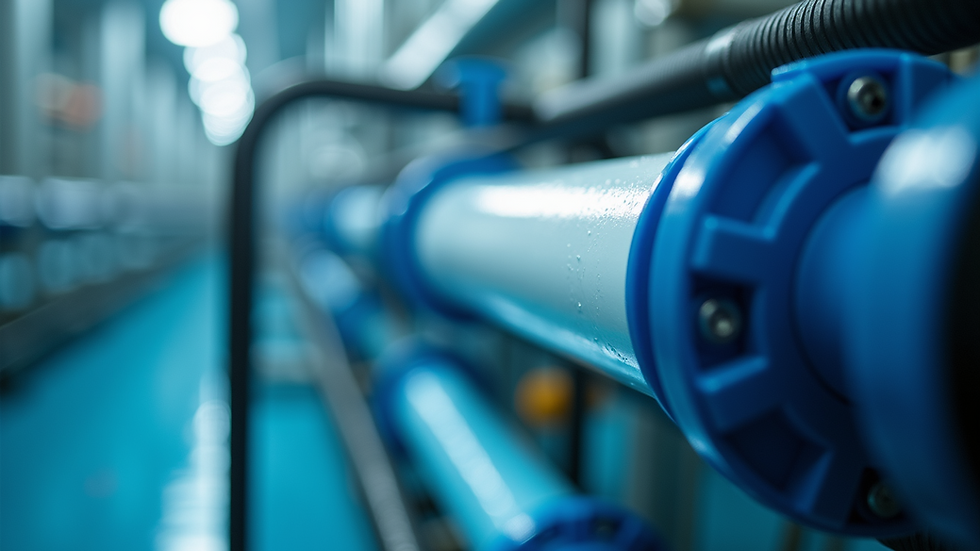The Importance of Filtration for Marine Environments
- Omri Farbstein

- Sep 15, 2025
- 4 min read
Marine environments are complex and delicate systems that require careful management to maintain their health and biodiversity. One of the most critical aspects of preserving these ecosystems is effective marine filtration. Filtration plays a vital role in removing pollutants, maintaining water quality, and supporting marine life. This article explores why marine filtration is essential, the different types of filtration systems, the challenges of reverse osmosis, and practical recommendations for improving water quality in marine settings.
Understanding Marine Filtration and Its Role
Marine filtration refers to the process of removing impurities, contaminants, and unwanted particles from seawater or water in marine aquariums. This process is crucial because marine organisms depend on clean water to thrive. Pollutants such as excess nutrients, chemicals, and suspended solids can disrupt the balance of marine ecosystems, leading to problems like algal blooms, oxygen depletion, and the decline of sensitive species.
There are several types of marine filtration systems, including mechanical, biological, and chemical filtration:
Mechanical filtration removes physical particles like debris and sediment through filters or screens.
Biological filtration uses beneficial bacteria to break down harmful substances such as ammonia and nitrites into less toxic nitrates.
Chemical filtration involves the use of activated carbon or other media to absorb dissolved organic compounds and toxins.
Each type of filtration plays a unique role in maintaining water quality. For example, mechanical filtration prevents clogging and sediment buildup, while biological filtration supports the nitrogen cycle, which is essential for detoxifying waste products.

Close-up view of marine filtration system components
The Benefits of Marine Filtration for Ecosystem Health
Effective marine filtration offers numerous benefits that contribute to the overall health of marine environments:
Improved Water Clarity
Filtration removes suspended particles and organic matter, resulting in clearer water. Clear water allows sunlight to penetrate deeper, supporting photosynthesis in aquatic plants and corals.
Reduced Toxicity
By filtering out harmful chemicals and waste products, filtration systems reduce toxicity levels, protecting fish, invertebrates, and other marine life from stress and disease.
Balanced Nutrient Levels
Excess nutrients like nitrogen and phosphorus can cause harmful algal blooms. Filtration helps maintain balanced nutrient levels, preventing these blooms and promoting a stable ecosystem.
Enhanced Oxygen Levels
Clean water supports better oxygen exchange, which is vital for respiration in marine organisms.
Support for Biodiversity
Healthy water conditions foster diverse marine communities, from microscopic plankton to large fish and coral reefs.
In practical terms, marine filtration is essential for aquaculture operations, public aquariums, and natural marine reserves. For example, aquaculture farms rely on filtration to maintain water quality and prevent disease outbreaks, while coral reef restoration projects use filtration to create optimal conditions for coral growth.

Eye-level view of coral reef with clear water
What is the Downside of Reverse Osmosis?
Reverse osmosis (RO) is a popular filtration method used in marine environments to purify water by forcing it through a semipermeable membrane. While RO systems are highly effective at removing contaminants, they also have some downsides:
High Energy Consumption
RO systems require significant energy to operate, which can increase operational costs and environmental impact.
Water Waste
RO produces a considerable amount of wastewater, often discarding 3 to 4 gallons of water for every gallon purified. This inefficiency can be problematic in areas with limited water resources.
Membrane Fouling
The membranes used in RO can become clogged or damaged by particulates and biological growth, requiring regular maintenance and replacement.
Removal of Beneficial Minerals
RO removes not only harmful substances but also essential minerals that marine organisms need, necessitating remineralization before use in aquariums or aquaculture.
Despite these challenges, reverse osmosis remains a valuable tool when combined with other filtration methods. For example, using RO water as a base and then adding back necessary minerals can create an ideal environment for sensitive marine species.

High angle view of reverse osmosis filtration unit
Practical Recommendations for Implementing Marine Filtration
To maximize the benefits of marine filtration, consider the following practical steps:
Assess Water Quality Regularly
Conduct frequent water tests to monitor parameters such as pH, ammonia, nitrite, nitrate, and salinity. This data helps tailor filtration strategies to specific needs.
Choose the Right Filtration System
Select filtration methods based on the environment and goals. For example, mechanical filters are essential for removing debris in aquaculture, while biological filters are critical for maintaining nitrogen balance in reef tanks.
Maintain Filtration Equipment
Regular cleaning and replacement of filter media prevent clogging and maintain efficiency. Follow manufacturer guidelines for maintenance schedules.
Integrate Multiple Filtration Types
Combining mechanical, biological, and chemical filtration provides comprehensive water treatment and reduces the risk of system failure.
Consider Advanced Technologies
Explore options like UV sterilizers, ozone treatment, and purified water systems to enhance water quality further.
Educate and Train Staff
Proper training ensures that personnel understand filtration system operation and maintenance, reducing errors and downtime.
By implementing these recommendations, marine facilities can improve water quality, protect marine life, and support sustainable operations.
The Future of Marine Filtration and Water Quality Management
As marine environments face increasing threats from pollution, climate change, and human activity, the importance of advanced filtration technologies will continue to grow. Innovations in filtration media, energy-efficient systems, and real-time water quality monitoring are shaping the future of marine water management.
Sustainable practices such as recycling wastewater, reducing chemical use, and integrating natural filtration methods like mangrove restoration are also gaining traction. These approaches complement mechanical and chemical filtration, creating resilient ecosystems.
Investing in high-quality filtration systems and staying informed about emerging technologies will be essential for anyone involved in marine conservation, aquaculture, or aquarium management.

Wide angle view of coastal marine environment with natural filtration
Marine filtration is not just a technical necessity but a cornerstone of preserving the beauty and biodiversity of our oceans. By understanding its importance and applying best practices, we can ensure healthier marine environments for generations to come.




